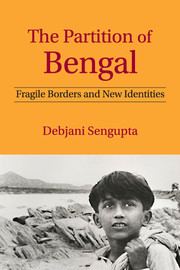Book contents
- Frontmatter
- Dedication
- Contents
- Acknowledgements
- Introduction
- 1 The Calcutta Riots in Representations and Testimonies
- 2 Noakhali and After: History, Memory and Representations
- 3 Colony Fiction: Displacement and Belonging in Post-Partition Bangla Fiction
- 4 From Dandakaranya to Marichjhapi: Refugee Rehabilitation in Bangla Partition Fictions
- 5 The Partition's Afterlife: Nation and Narration from the Northeast of India and Bangladesh
- 6 Uncanny Landscapes and Unstable Borders: Politics and Identity in Geo-Narratives of the Partition (2005–10)
- Bibliography
- Index
Introduction
Published online by Cambridge University Press: 18 December 2015
- Frontmatter
- Dedication
- Contents
- Acknowledgements
- Introduction
- 1 The Calcutta Riots in Representations and Testimonies
- 2 Noakhali and After: History, Memory and Representations
- 3 Colony Fiction: Displacement and Belonging in Post-Partition Bangla Fiction
- 4 From Dandakaranya to Marichjhapi: Refugee Rehabilitation in Bangla Partition Fictions
- 5 The Partition's Afterlife: Nation and Narration from the Northeast of India and Bangladesh
- 6 Uncanny Landscapes and Unstable Borders: Politics and Identity in Geo-Narratives of the Partition (2005–10)
- Bibliography
- Index
Summary
Doesn't a breath of the air that pervaded earlier days caress us as well? In the voices we hear, isn't there an echo of now silent ones? If so, then there is a secret agreement between past generations and the present one… Then our coming was expected on earth.
Walter Benjamin, On the Concept of HistoryThe memorable is that which can be dreamed about a place.
Michel de Certeau, The Practice of Everyday LifeThe 1947 partition of Bengal is significantly different in its aftermath than the sudden cataclysmic division of Punjab because of several historical, social and political reasons. Bangla literature, that is based on the partition's experiences, is therefore also varied and multifarious in its responses to 1947 not simply as an event, but as a metaphor or a trauma or a site of enunciation for thousands of people living through and resisting communal polarization, migration, rehabilitation and resettlement. Taking a cue from the Annales historians, one can surmise that the partition in the East is the longue durée rather than the short time of political event/s, where the structures and pluralities of social life under its shadow can be unearthed only through a study of the particular and the local. Even after all these years after Independence, the partition of the Eastern part of the subcontinent has been a neglected area, although some recent historiography has drawn our attention to the economic, political and historical issues of decolonization in the region. Unlike the sudden and catastrophic violence that shook Punjab, enunciated through the tropes of madness, rape and murder, the Bengal region has seen a slower, although no less violent, effect of the vivisection with the trauma taking a more elliptical and metaphysical turn. This is evident when we study the enormously rich and varied literature that partition has produced amongst the Bangla speaking people of West Bengal, the Northeast and Bangladesh – one that has not been studied together in an organic manner. This literature deserves our critical attention because it destabilizes certain assumptions about 1947 just as it demarcates the way geographical areas, not always contiguous, become the theatres of recuperation, mythmaking and sustainability that give rise to different kinds of representations.
- Type
- Chapter
- Information
- The Partition of BengalFragile Borders and New Identities, pp. 1 - 35Publisher: Cambridge University PressPrint publication year: 2015



